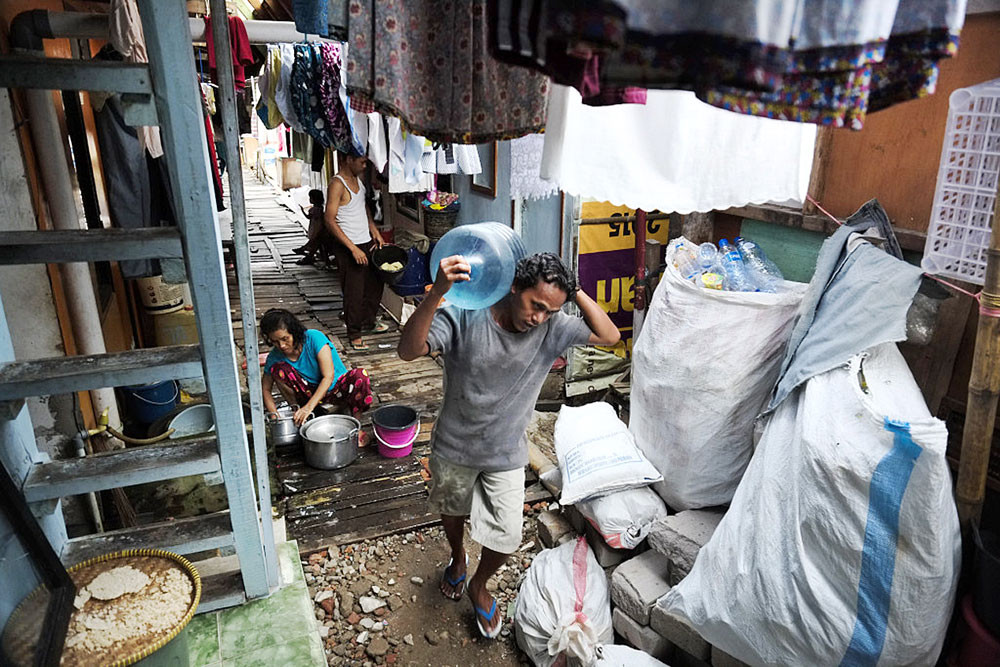Popular Reads
Top Results
Can't find what you're looking for?
View all search resultsPopular Reads
Top Results
Can't find what you're looking for?
View all search resultsTo build cities for women, by women, with women
A similar business-as-usual sentiment exists when it comes to the participation of women in musrenbang.
Change text size
Gift Premium Articles
to Anyone
M
any women living in big cities in Indonesia often have to take the longer way to work or school to home because the shorter route has no sidewalk, no proper lighting, or other hindrances that make them uncomfortable. Most people do not question this habit. But when those experiences accumulate, sooner or later they will subconsciously tell others one thing: the city was not built for them.
The National Commission on Violence Against Women (Komnas Perempuan) received more than 400,000 reports of violence against women in 2019, of which 28 percent took place in public spaces. In the book Feminist City, feminist geographer Leslie Kern underscores how most cities around the world were built upon men’s experiences as the “norm”’ with little regard for how the city creates roadblocks for women and ignores their day-to-day experience of city life.
Women’s experiences are often missing — or regarded as a formality and treated with bias — when it comes to city planning and development.
In a bid to improve women’s participation in development, the 2004 the General Elections Law mandates a 30 percent electoral gender quota to ensure women’s involvement in legislative forums. But in reality, representation and the quota system has not necessarily translated into gender-responsive policies. The Association for Elections and Democracy (Perludem) reported that women representation in the House of Representatives had increased in the past two decades. Yet, deliberations of critical women-focused bills, such as the sexual violence eradication bill, have stagnated.
Amid various movements advocating the crucial bill and other women’s issues in the country, participatory budgeting opens an opportunity to revive and reclaim a particular governance mechanism that involves all citizens, including women, in improving their living environment. The mechanism is known by its Indonesian acronym as musrenbang, a bottom-up, community participatory development planning.
The musrenbang was introduced in 2000, less than two years after the sweeping reforms, as an antidote for a heavily bureaucratic model of development that typified the New Order Era. The practice was later formalized in 2004 through a law that allows each city or regency to create its own participatory budgeting mechanism.
While the move was well-intentioned, very few regions have utilized the mechanism. Kota Kita’s study with the Making All Voices Count program on participatory budgeting practices in six Indonesian cities found that the musrenbang forum has not led to significant systemic changes of local governance despite its potential.
Instead, citizen participation in the budgeting processes became tokenistic, and as a result, many citizens were disillusioned. A similar business-as-usual sentiment exists when it comes to the participation of women in musrenbang.
As collective awareness on women’s rights begins to improve in Indonesia, the musrenbang spirit can play an essential role as a platform for all citizens, including women, to decide and get involved in building more inclusive cities. The first step to reviving the musrenbang is by going beyond representation and focusing efforts on meaningful participation.
While the 30 percent women representation quota in the legislature is an important entry point for women to be present in these forums, better engagement is necessary to ensure women actively participate and express their aspirations. One solution is by organizing activities outside of the forum to capture more comprehensive insights into their needs, encouraging the inclusiveness of the participatory planning and budgeting as an entire process.
In the age of physical distancing, innovative approaches — both in the form of technology and non-technology solutions — are also necessary to ensure nobody is left unheard.
Banda Aceh is among the first cities to have accommodated women’s voices in its development and planning process with its first gender-sensitive forum called Women Action Planning Deliberation (Musrena) in 2007. Through the Musrena forum, women are free to openly convey their aspirations starting from the gampong (kampung) level to the higher representation level. This model was later replicated in many cities in Indonesia, including Yogyakarta, to mainstream gender policies and gender-responsive budgets.
Efforts to accommodate women’s voices must also integrate women’s perspectives in the decision-making processes of cross-sectoral urban development issues, such as infrastructure. Women-led organizations like the Family Welfare Movement (PKK) have been known for their successes in community organizing and mobilization while having rich insights into a community’s environmental and social needs.
Furthermore, as women and mothers are typically responsible for managing the needs of their households, they are more likely to utilize their surrounding spaces more frequently than their male counterparts. But in formal settings, women’s roles and expertise tend to be allocated on issues related to health and children. In this case, the nuanced gendered experience of women becomes integral to build a city that genuinely benefits the needs of all citizens.
Improving women’s participation in city planning and development is not only about reclaiming women’s rights in the city or closing the gender gap in the development and planning process; it is about how women make a bigger impact in building a city by and for women and for all citizens in the city.
The participation of women plays an essential role in laying the foundation for overcoming inequality, promoting sustainability, and ultimately, improving our cities. To build a city for all we can start by reclaiming the musrenbang as a meaningful space to absorb the aspirations and experiences of all citizens, including women.
***
Hasanatun Nisa Thamrin is an urban planner and advocate for participatory approaches in governance in her role as program manager for urban governance at Kota Kita. Vanesha Manuturi is the communications and advocacy manager at Kota Kita.










